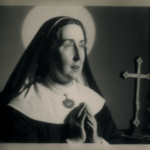St. Francis de Sales
St. Francis de Sales
When they lived: St. Francis de Sales lived from August 21, 1567, to December 28, 1622.
Where they lived: St. Francis de Sales was born in Thorens-Glières, Duchy of Savoy, which is now part of France. He later became the Bishop of Geneva, which is in Switzerland.
Notable world events during the time of their life:
- The European Renaissance (14th to 17th century): This period saw a flourishing of art, literature, and learning, with figures like Shakespeare, Galileo, and Michelangelo making significant contributions. St. Francis de Sales’ lifetime overlapped with the later part of this transformative era.
- The Thirty Years’ War (1618-1648): This devastating conflict in Central Europe had profound political and religious implications. It’s important to note that St. Francis de Sales lived during the early years of this war, which was driven by religious and territorial disputes.
- The beginnings of the Scientific Revolution: St. Francis de Sales was alive during a time when the foundations of modern science were being laid. Galileo’s observations with the telescope, Kepler’s laws of planetary motion, and the works of early modern scientists started shaping the way people viewed the universe.
- The founding of Jamestown (1607): In the midst of St. Francis de Sales’ life, the first permanent English settlement in the Americas was established in Jamestown, Virginia, marking a significant moment in the colonization of North America.
Their patronage: St. Francis de Sales is the patron saint of writers, journalists, and the Catholic press, a fitting designation given his own prolific writings and his role in spiritual guidance through letters. He is also the patron of the deaf, due to his compassionate work with a young deaf man and his dedication to communication.
Early Life
Saint Francois Bonaventura De Sales, Also stylized as Francis Bonaventure De Sales, was born to a noble family in the Chateau DeSales, Duchy of Savoy. He was born on August 21st, 1567, to Francois de Sales and Françoise De Soinnaz.
His father was Lord of Sales, and his mother was the only child of Melchior de Sionnaz, one of the most distinguished Magistrates at that time. This couple, however, would go on to adopt the last name ‘De Boisy.
Saint Francis De Sales was born two months premature by his teenage mother, but this did nothing to deter his physical and mental growth. He was baptized as Francis Bonaventura in honor of two saints and after his godparents, François de la Fléchère and Damoiselle Bonaventure de Chevron-Villett, his grandmother.
Being one of the most respected families around, Saint Francis’ parents were rich enough to send him to the best schools in France. As the first of six children, his father wanted him to pursue a career in law, following in his footsteps.
As a young boy, Saint Francis was kind, gentle, and more interested in religion than anything else. He was devoted to his scriptures and was dedicated to supporting the poor and helpless. To please his father, however, he said nothing of his religious dedication and carried on with his education.
Saint Francis was sent to the best schools and got the best education at that time. His first introduction to formal education took place in La Roche-Sur-Foron. At the tender age of eight, he was sent to college in Annecy.
Now nurturing religious plans, Francis De Sales attended a Jesuit college in 1578. The institution was called the College De Clermont, and there he studied rhetoric and the humanities.
A quiet young man, he kept his quest for devotion a secret and continued to study. He also took up riding, dancing, and fencing training to please his father.
Saint Francis attended a theological seminary circa 1586, where he was convinced he was damned to hell. This thought made him depressed and physically ill until 1587, when he visited a Church Parish. He prayed to the Blessed Virgin and consecrated himself.
Dedication and Devotion
Saint Francis remained devout to God but carried on with his studies. After completing his education at Clermont, he went on to Italy to enroll at the University of Padua.
There he studied law and theology and sought Priest Antonio Possevino to be his spiritual guide.
He received his Doctorate at Padua in 1592 and had finally made up his mind to become a Priest.
Back at home, he started work as a lawyer while his father tried to pull strings in Francis’ political favor. He was also bequeathed to a rich heiress, whom he turned down to his father’s dismay. Finally, he let his father know that he had decided to pursue ecclesiastical duties instead of political ones.
His Father was very unimpressed, but his cousin supported him and helped him get the post of provost. Francis signed over his birthright to his younger brother and was ordained in 1593.
Legacy
Saint Francis De Sales carried out his religious duties with so much humility and patience. He ministered at the Cathedral of Annecy, which was 20 miles away from his residence.
He went around to preach the gospel and win souls for Christ. He was shunned and sent away by many, but he never gave up. At the young age of 27, he was elected Grand Penitentiary of the diocese.
In 1954, Saint Francis was asked to take on a rather difficult assignment. On the instruction of the Duke of Savoy, Francis was sent to Chamblais.
Accompanied by his cousin, Canon Louis, Saint Francis De Sales set off to spread the Good News all over Chamblais.
There, they were antagonized by Geneva ministers. He escaped death many times. It was during those times that he met and befriended a widow.
Saint Francis made it a point to always split his possessions with the poor. It didn’t matter if it was food, clothing, or money.
It was at Chablais that he started to use written pamphlets to minister to the townspeople. Where the door was shut in his face, he simply slipped pamphlets underneath and left.
Saint Francis was elected coadjutor bishop in 1599. Circa 1602, he was sent out to negotiate the re-establishment of a Catholic Church with Henry IV of France.
When Bishop Granier died in 1602, Saint Francis De Sales was ordained bishop. He was methodical and passionate, and a lot was achieved under his diocese. He began to grow in respect and popularity.
During his papacy, he worked with the Order of Friar Minor Capuchin and was made an official associate of the Order.
In his time, Saint Francis also wrote books that are acknowledged as important works on the human spiritual life. He was co-founder of the Order of the Visitation of Holy Mary, which was established in 1610.
Saint Francis De Sales also built The Oratory of Saint Philip Neri, which died out after his death.
Death and Canonization
Saint Francis De Sales died of a stroke on the 28th of December. He died in Lyon, France, during a Christmas tour.
Saint Francis was buried on the 24th of January 1623 in the Church of Annecy where he was venerated after death. His heart was kept in Lyon for some time before it was taken to Venice by the visitation nuns during the revolution.
He was beatified by Pope Alexander VII on January 8, 1661, and canonized by St. Francis de Sales on April 19, 1665.
Pope Pius IX proclaimed him Doctor of the Church in 1877.
Saint Francis de Sales is celebrated by the Roman Catholic Church on January 24. He is also honored in the Church of England on the same day.
5 Interesting Facts About St. Francis de Sales
- Did you know that Saint Francis is known as the patron saint of
authors, journalists, and deaf people? - Did you know that Saint Francis is considered the first preacher to
use pamphlets to preach the word? - Did you know that Saint Francis de Sales is called “The Gentleman?
Saint” because of his patience and meekness? - Did you know that Saint Francis gave spiritual guidance to people?
through letters? He read and replied to all letters, regardless of
their number. - Did you know that Saint Francis wished to go into solitude but could
not because the people demanded his presence?
Prayer of St. Francis de Sales
Be at peace. Do not look forward in fear to the changes of life; rather, look to them with full hope as they arise. God, whose very own you are, will deliver you from them. He has kept you hitherto, and He will lead you safely through all things. When you cannot stand it,God will bury you in his arms. Do not fear what may happen tomorrow; the same everlasting Father who cares for you today will take care of you then and every day. He will either shield you from suffering or give you unfailing strength to bear it. Be at peace, and put aside all anxious thoughts and imagination.
Source:[https://www.catholic.org.au/prayers/the-prayer-of-st-francis-de-sales]{.ul}



